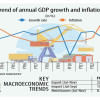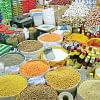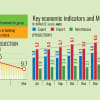BB eyes rate cut to 7% if inflation slows to 5% by March

GOVERNOR SAYS
- No money was printed to support govt as of now
- BB injected some liquidity to help some banks pay depositors' money
- There is no shortage of dollars for importing liquefied natural gas
The Bangladesh Bank will consider slashing the policy rate to 7 percent by March, provided that rampant inflation, which has hovered above 9 percent for nearly two years, eases to 5 percent by then, Governor Ahsan H Mansur said yesterday.
Inflation was recorded at 9.35 percent in March this year while the policy rate, or repo rate, which refers to the interest commercial banks must pay on funds borrowed from the central bank, currently stands at 10 percent.
"If inflation comes down further, we could cut the policy rate to 6 or even 5 percent — but it depends on how well we meet our inflation target and manage the economy," he said.
Mansur made the comments at a panel discussion organised by Building Technology & Ideas (bti) Ltd, a real estate company, in Dhaka, titled 'Investment Options in Current Economic Condition'.
In addition, the governor emphasised the need to maintain a positive real interest rate to protect savers or depositors.
"We can't let savers be squeezed out. We have to encourage them while also ensuring conditions remain tolerable for investors," he said. "To achieve this, we will need to tackle two challenges at the same time. There's no silver bullet.
"On top of that, we have to address inflation as well as the exchange rate. Without a reasonable degree of macroeconomic stability or the exchange rate remaining relatively stable, we won't be able to keep inflation under control," he said.
"Yes, there's macroeconomic complexity here, but it's doable." However, the governor also underscored the need to check the budget size.
"We can't implement the budget by printing money or without collecting sufficient revenue. That won't work.
Nor can we keep borrowing from abroad to implement the budget. That's not sustainable.
"Overall, we must bring stability. We can't live off borrowed money forever," he said.
In response to a question asking why the central bank had printed money to provide liquidity support to ailing banks at the end of last year despite its aim to fight inflation, Mansur said, "No money has been printed to support the government as of now. The only reason I had to inject some liquidity was to help certain banks pay depositors their hard-earned money."
He said it was done only for the sake of depositors who were lining up to withdraw their funds.
"That was the reality of the situation we inherited. We're now trying to stabilise the system, and hopefully, we'll move toward a resolution through bank restructuring and related reforms," he said.
During the discussion, Mahfuz Anam, editor and publisher of The Daily Star, said the government should prioritise remittance earners, give them skills training, and ensure their safety and security.
Last year, Bangladesh received $23 billion in remittances. Just last month, it was $3 billion.
He said the government is not giving enough importance to those who are contributing to keeping the economy vibrant.
Mansur also acknowledged the pay gap between workers from Bangladesh and those from other countries.
"It reflects a gap in our training, our knowledge, and the overall skill level of our expatriate workers. They're not aligned with what the global job market demands," he said.
"So, we need to fix that at home, starting with our education system, our training programmes, especially pre-departure training. These must become far more rigorous."
He added that institutional reform is a must. The government has taken some palliative measures — like setting up lounges at the airport for outbound expatriates or offering subsidised food.
"These are positive gestures, and I welcome them. They're commercially and emotionally valuable."
Mansur added that all the dollars required for importing liquefied natural gas (LNG) are now available.
"Earlier, some reputable companies refrained from LNG auctions because we couldn't make payments on time. That affected the market.
"But now, global LNG prices have come down and so has the markup on Bangladesh's imported LNG.
"Previously, some of our gas import agreements — worth hundreds of millions of dollars — had completely collapsed. Those issues have since been resolved."
At the event, Chowdhury Ashik Mahmud Bin Harun, executive chairman of Bangladesh Investment Development Authority, said they would allocate unused lands of BEZA for solar plants.
"A decision has been made in principle in this regard. We're doing our first experiment in Feni on around 300 acres of land that has been allocated to ADB to find potential generation partners," he said.
FR Khan, managing director of bti, moderated the panel discussion.

 For all latest news, follow The Daily Star's Google News channel.
For all latest news, follow The Daily Star's Google News channel. 








Comments